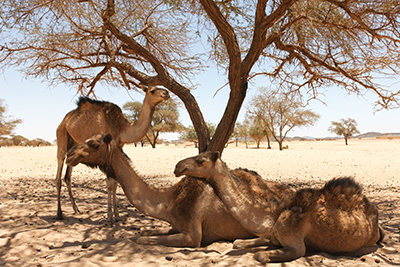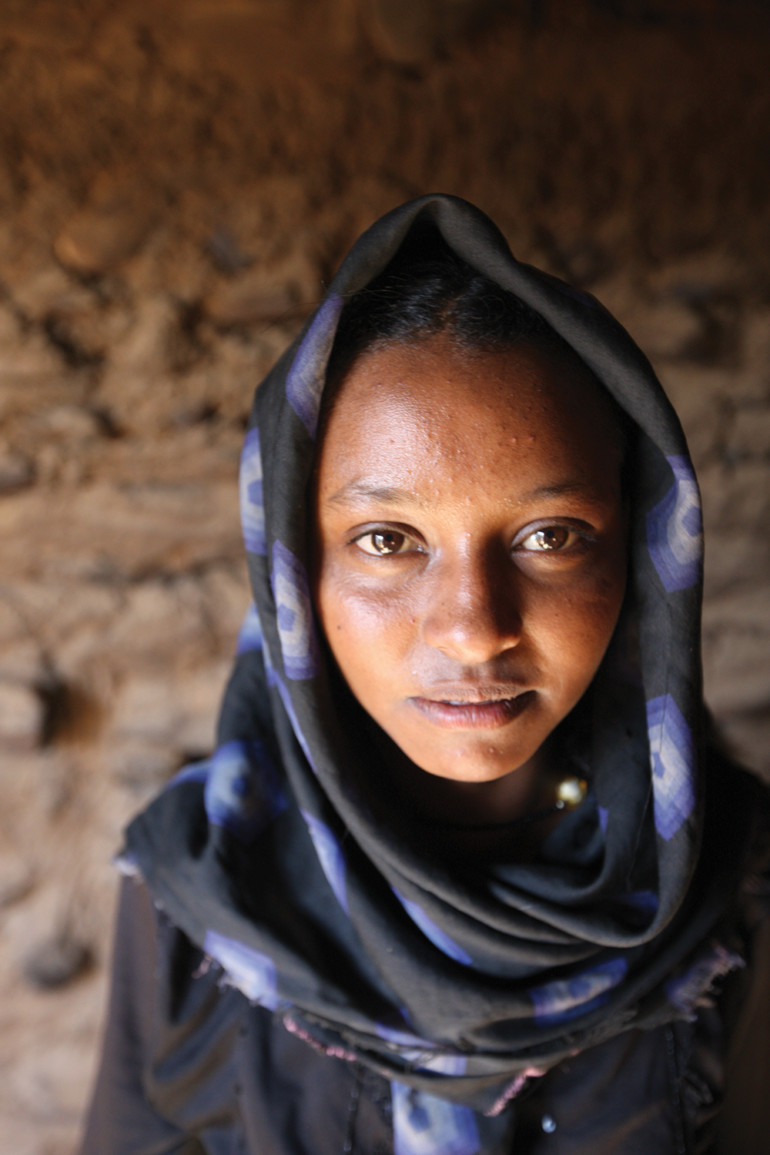
José luiz fernández liz
I LIE IN THE middle of the road somewhere in the remote desert about 100 miles north of Khartoum, Sudan. It feels like I am in a frying pan because of the hot afternoon sun, and the SUV is next to me with blown-out windows and broken doors. I smell fuel leaking but I cannot move out of the way of danger and every breath I take feels like someone is stabbing me in the chest. I think I am going to pass out and the Leonard Cohen song “Closing Time” is playing in the back of my mind. The thought that this might be it for me begins to take hold. After all these years and extreme adventures in Tibet, Afghanistan, Pakistan, the Arctic and other wild places, my last breath will be in the desert of Sudan.
A few minutes before, we were stopped at a roadside restaurant to have a quick lunch on the way to a camp called Dongola in the desert, but as we were speeding along, a strange sound came from the front of the SUV. We began to swerve and the next thing I knew, the vehicle started to flip over and over again, glass flying all over inside and the sound of metal hitting hard on the road. We flipped three times before coming to a stop in the middle of the two-lane road and were very lucky there was no oncoming traffic at the time.
Now, another SUV that was following us stops and people are running toward me asking if I am OK. I cannot speak due to the pain and they drag me by my feet to the side of the road. My travel mates in the other SUV are from the U.K. and Spain. Everyone is stunned and trying to help me feel better. It is close to 100 degrees but I feel cold and I am shaking.
The decision is made to put me in the other SUV and head back to Khartoum to find a hospital. Waiting for an ambulance would take too long. I am beginning to fade and Toby, a wonderful guy from the U.K., is talking to me, trying to keep me awake. After about an hour we see a red ambulance coming in the opposite direction and my companions flag it down. We are in the middle of a small village and it seems like the whole town comes to watch me get transferred to the emergency vehicle. As the ambulance heads toward Khartoum the male nurse is very attentive and keeps reciting verses from the Koran in my ear.
A Medical Misadventure
We arrive at a hospital but there are no doctors there so we try two more. Finally we find a doctor at the third hospital, where I am carried into the emergency room. There are no dividers between beds. Next to me the doctors are performing a tracheotomy on a man while his family is outside the room wailing and crying. As this goes on, a helper in the emergency room is casually mopping blood from the floor as if cleaning up a water spill.
A doctor finally comes in, looks me over and gives me a shot, which temporarily quells most of the pain. They decide to take me for X-rays. Toby is still with me helping but as soon as they wheel me to the X-ray room the machine breaks down, so back out I go. This happens three times, with Toby laughing a little more each time. I am being rolled back and forth from the emergency room to the X-ray room like something out of a Monty Python skit.
knew, the vehicle began to flip over and over
again, glass flying all over inside and the
sound of metal hitting hard on the road."
After a couple of hours of this, I decide I have had enough. I go back to the hotel to try and recover there in silence and peace.
But for a tour and adventure leader like me, staying put is not easy. After two days in the hotel room I decide, since no bones are showing outside my skin and there does not appear to be any internal bleeding, to try and see what I can of the country anyway. The ordeal of trying to get home while in pain and sitting in a plane seat for 23 hours seems impossible. The tour operator sends a car and before I know it, I am off to meet the others from the small tour group already up north. This was my seventh near-fatal accident in my career and it seems like, if this is it for me, I should go out with a bang.
The drive is long. We pass the scene of the accident in silence; then, like life, we move on. I am in serious pain but it feels good to see the desert outside the car window.
Back on the Road
It is good to be back with the group. We are in Sudan, the third largest country on the African continent, for an exploratory trip. Sudan is composed mostly of flat plains broken by several mountain ranges and is an Arab republic in the Nile Valley of North Africa. It is home to more than 30 million people. The town we have just left is the capital and is located at the confluence of the  White Nile and Blue Nile before they join to form the River Nile. Sudan is an exotic country, with friendly and welcoming people. Driving through the desert is meditative. Seeing the nomads traveling along with their animals takes you back to a bygone era. The Islamic religion here is not as strict as in other regions. The women don’t cover their faces and they readily speak to foreigners. Some houses in the Nubian villages are painted and decorated with colorful patterns and flowers. Enthusiastic hospitality abounds; people will often invite foreigners to visit their home and share a meal or a cup of spiced tea.
White Nile and Blue Nile before they join to form the River Nile. Sudan is an exotic country, with friendly and welcoming people. Driving through the desert is meditative. Seeing the nomads traveling along with their animals takes you back to a bygone era. The Islamic religion here is not as strict as in other regions. The women don’t cover their faces and they readily speak to foreigners. Some houses in the Nubian villages are painted and decorated with colorful patterns and flowers. Enthusiastic hospitality abounds; people will often invite foreigners to visit their home and share a meal or a cup of spiced tea.
We spend two days in a charming small hotel in Karima, a small town on the right bank of the Nile, close to a famous archaeological site at the foot of Jebel Barkal, where the ruins of 13 temples and three palaces exist. We visit the royal necropolis of the ancient city of Napata, the Nubian capital from 800 to 400 B.C.
The next day we continue on and drive through the Bayuda Desert. Here we meet groups of Bisharin nomads who live in familial groups in small huts made of intertwined branches close to the rare water wells. With them are their caravans and herds of camels and cattle.
In the late afternoon we arrive at Meroë, where we stay in a wonderful tented camp with an incredible view of more than 40 pyramids that are located on top of a hill. Some of the perfectly preserved pyramids belonged to the Royal Necropolis of Meroë.
It is nearly a full moon, and since I cannot lie down and sleep, I walk outside my tent to watch the incredible night sky in the desert. One of my travel mates, Amelia from London, is outside as well, and we have a very deep conversation about life and travels to exotic places. Interesting how the desert and sky open your soul.
with an incredible view of more than 40
pyramids that are located on top of a hill."
We visit the pyramids the next morning. It is wonderful, and since no other foreigners are there, it feels how it must have for a traveler in Egypt in the 1920s. Several pyramids stand out with sharp shapes against the clear sky. Each one has its own funerary chapel, with the walls fully decorated in bas-reliefs showing aspects of the king’s life and his offerings to the gods. There are more pyramids in Sudan than in Egypt.
Our trip draws to a close, and we drive back to Khartoum. On the way we find time to visit a few wonderful archaeological sites in Naga. Included is a visit to a temple from the first century A.D. dedicated to the Nubian warrior god Apedemak. It is a wonderful building with bas-relief decorations depicting the Meroitic deity with a lion’s head, the pharaoh, noblemen and several ritualistic images. Then we visit a large bazaar in a city in the middle of the desert where we are told by authorities not to take pictures. The government does not want to show the rampant poverty in the country.
We arrive in Khartoum in late afternoon, and at midnight I board my plane armed with strong pain medication. During the long flight to Frankfurt the accident plays in my mind over and over in slow motion and something I read long ago creeps into my mind: “Live today, because you never know what can happen in the future.” Whether you find yourself in a dangerous situation or not, it seems like a phrase worth considering.


